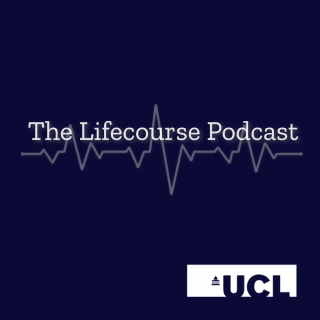The Lifecourse Podcast is a series of audio interviews about research that is addressing major policy issues around our health and well-being and our family and work circumstances.

Researchers discuss the context of their work, what they have found, what those findings mean and how they can be used to improve people's lives.
If you like what you hear, why not subscribe on Apple Podcasts or search for us on your podcasting app. We have just launched Series 2!
The role of positive experiences for young people growing up
In Episode 6 of Series 2 of The Lifecourse Podcast we're talking about the impact on young people's lives of positive experiences and asking if it's time to shift the research and policy narrative away from the negative experiences facing those young people. Chris Garrington is joined by Rebecca Lacey, a researcher based at UCL, who's been investigating how positive experiences are linked with children and young people's physical and mental health and Ann Hagell from the Association for Young People's Health.
Further information
Losing a parent: substance misuse and suicidal behaviour around the anniversary of their death
In Episode 5 of Series 2 of The Lifecourse Podcast, Professor Scott Montgomery of Örebro University discusses research showing an increased likelihood of drug misuse and suicidal behaviour among young people who have lost a parent around the anniversary of their death. He is joined by child bereavement specialist Beck Ferrari and Olivia Clark-Tate whose father died nearly 10 years ago.
Further information
The physical punishment of children: using the law to protect them and promote change
In Episode 4 of Series 2 of The Lifecourse Podcast, Dr Anja Heilmann from the Department of Epidemiology and Public Health at University College London (UCL) talks about the physical punishment of children and how and where the law is being used to protect children against it. She's joined by Bruce Adamson, the Children and Young People's Commissioner for Scotland and children's rights advocate and former Irish Senator Jillian van Turnhout. Together they talk about how the law has been changed in Ireland, Scotland and Wales and discuss the prospects for change in England.
ACES: what the evidence says about adverse childhood experiences
In Episode 3 of Series 2 of The Lifecourse Podcast, Dr Rebecca Lacey from ICLS is in conversation with Kirsten Asmussen from the Early Intervention Foundation about Adverse Childhood Experiences (ACEs).
Further reading and useful links
Getting to grips with Multiple Sclerosis: using experience and evidence for change
In Episode Two of Series 2 of the Lifecourse Podcast from the ESRC International Centre for Lifecourse Studies we discus getting to grips with Multiple Sclerosis. Our guests are Scott Montgomery from Örebro University and the Karolinska Institute in Sweden, who has been researching MS for more than 20 years.
Smoking in Canada: still a threat to public health?
In Episode One of Series 2 of the Lifecourse Podcast, Dr Thierry Gagné from the ESRC International Centre for Lifecourse Studies at University College London and Cynthia Callard, Executive Director at Physicians for a Smoke-Free Canada discuss a body of new research on smoking and vaping in Canada p
Lockdown, unpaid care and mental health
In this episode of the Lifecourse Podcast from the ESRC International Centre for life course studies at UCL Dr Baowen Xue and Professor Anne McMunn discuss how they used specially collected COVID19 data to look at how couples divided up housework, childcare and homeschooling during lockdown, who was most likely to change their work pattern and the impact on mental health.
A childhood in care: what consequences for health later on?
In this episode of The Lifecourse Podcast, Professor Amanda Sacker and Dr Emily Murray discuss their research looking at the long term consequences on a person’s health from a childhood spent in care.
Parenting for a digital future: the hopes and fears that shape children's lives
Sonia Livingstone from the London School of Economics discusses the research behind her new book, Parenting for a digital future: how hopes and fears about technology shape children’s lives.
A lifetime of obesity: what does it mean for how we manage physically later on?
Snehal Pinto Pereira from ICLS discusses her research in the International Journal of Epidemiology looking at the links between obesity across childhood into adulthood and their ability to manage daily physical tasks later on in life.
Pages
 Close
Close


